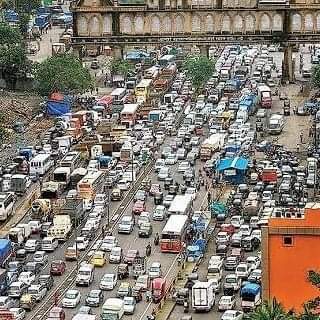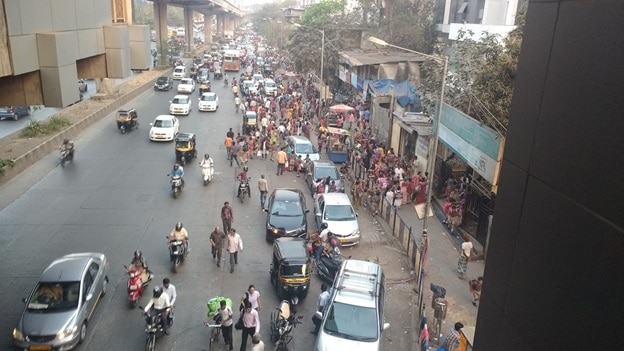More than 2,500 people die and over 3,000 are injured annually in Mumbai’s suburban network, considered the lifeline of India’s commercial capital.
Quoting figures from the Railway Police, the Economic Survey of Maharashtra 2019-20, reveals that in 2017, there were 3,014 deaths and 3,345 injuries, while in 2018, this number was 2,981 and 3,349, respectively. On a particularly deadly day, 18 July 2019, 18 people died – the maximum in a single day. These include 12 on Central Railway and 6 on Western Railways.
The latest conundrum surrounding the location of the Metro 3 car depot needs to be viewed in this context. In this political tug of war, no matter who emerges as the winner, the losers will be Mumbai’s hapless commuters.
Metro Line 3 is not only the most ambitious project, it is important for reducing the burden on Mumbai’s local train service. As this service, Colaba-Bandra-Seepz, broadly runs between Andheri-Ghatkopar stretch in north to Cuffe Parade in South, it will really take a big load off the suburban rail network. Line 3 is also expected to reduce road congestion, besides reducing the load on the Western Line between Bandra and Churchgate.

The trains that kill
Let us look at another statistic. Road traffic conditions in Mumbai are horrendous – congested and poorly maintained roads and reckless drivers are a fatal combination.
In 2019 in Mumbai City there were 2872 road accident registered that resulted in 447 fatalities. Even one death due to road accidents is one death too many. And if we take suburban rail network fatalities, daily deaths due to road and rail accidents are around 9.
85 percent of the tunnelling work and 65 per cent of the civil work has been completed for the metro so far. The first phase of this line was originally scheduled for completion by September 2022 and the full line, by March 2023. Around Rs 16000 crores have been already spent on the project.
Without a car depot the line cannot become operational no matter how fast rest of the engineering work is done. And the car depot is now stuck into a political quagmire – there has been no movement since November 2019 after the current government stopped the work on the car shed. According to some commentators, if the car shed has to be moved to a new location it will push back the commencement of the line by three to four years. It does not take too much imagination to infer the human cost of such a delay in terms of avoidable deaths of road and rail commuters.
Why are citizens silent?
It is unfortunate to see a total lack of outrage from the citizenry on this subject. This is in sharp contrast to the activism seen when the car shed was being built at Aarey. One suspects that the candlelight marchers had never experienced the joys of a journey on suburban trains or else they would have weighed the consequences of their action more carefully. It is futile to blame politicians, they are always looking for troubled waters to fish in.
The heart of the matter is the total disregard which the ruling establishment shows for the people. The current government had appointed a panel of experts to explore whether alternative locations were available for shifting the care shed. This panel submitted its report in January 2020 which has not been made public. Why is this that nobody has demanded that the report be made public since this is a matter of utmost public importance? The fact remains that the politicians treat the public with total contempt, except during the election period.

Traffic, pedestrians, parked vehicles, vendors – all on the road (Photo: Rishi Aggarwal)
Money talks
Apart from the human lives cost by this delay, there are associated costs. Firstly, the financial. The return on Rs.16 thousand core spent so far will be delayed by at least three to four years. The financing cost of these funds will be compounded – according to published information, the cost of the entire corridor is estimated at ₹30,000 crore.
Let us unravel this number. In 2016, JICA (Japan International Cooperation Agency) commenced providing financial assistance for the project in the form of a soft loan through the Ministry of Urban Development at an annual rate of interest of 1.44%. This amounts to ₹13,235 crore for the (then) ₹23,136 crore project. Other financing will come from the central and state governments in the form of equity and debt, and a few other sources. In March 2019, the then MMRC managing director stated that the actual completion cost of the project is ₹30,000 crore, and presumably the financing structure will undergo consequent changes. Even if we momentarily ignore the soft loan provided by JICA, the remaining funding, around 16000 cores, would carry an actual interest or has an opportunity cost if it is in the form of equity. Add to that the inevitable cost escalation – relocation costs plus impact of inflation on the ongoing work. Most importantly, this political one-upmanship damages the credibility of our ruling establishment globally. Which financier, global or local will now come forward to commit funds if the fate of the projects changes with the change of the political party in power? One also assumes that there are contractual clauses relating to execution timelines and one wonders whether the legal consequences of such impediments in project execution have been taken into account.
Delay in Metro 3 will also have serious implication beyond the obvious ones. Timely completion will substantially reduce number of vehicles used for commuting, at least in those areas where the Metro lines serves. This directly translates into a meaningful reduction in pollution, with the attendant health benefits.
What you can do
It is therefore important that the citizens raise their voices and exert pressure on the government for the expeditious completion of the line. The only thing politicians fear is public outrage and this destructive dispute over the location of car depo is patently outrageous. It is lamentable that Mumbaikars have lost the appetite for expressing outrage. As someone has said, we are either resigned to our fate or have withdrawn into a ‘gated republic’.
The root cause has been very aptly described by Vivek Gilani, founder of Mumbai Votes and Avinay Umesh Sanyogita in their interview, published in Indian Express Mumbai:
“It largely has to do with the way politics or democracy works in India. It is patronage based. Culturally also we do not value accountability and transparency. Politics is a reflection of our culture. …. The privileged parts of society are largely apolitical…. The ones who are politically engaged, mainly those who are at the bottom of the pyramid, are much less apathetic. In these parts, performance still matters in terms of electability. However, there, too, patronage plays a part. …… The sharpness and competence of civil society to hold representatives accountable has diminished.”
Civil Society in Mumbai has to hold the politicians accountable for this delay in Mumbai Metro Project. A few avenues for doing so come to mind:
- File a RTI Application for making the Expert Committee Report Public
- File a PIL in the Mumbai High Court to force the government to come clean and give a commitment towards completion of the project
- Mumbai municipal elections are due in 2022, and preparations for capturing this Alibaba’s cave are already under way. Why cannot citizens come together and declare a public manifesto that they will only vote for a party that promises to complete all infra projects on time, including Metro 3? Politicians are mortally afraid of vocal public pressure. The lure of the lucre that attracts the politicos to gain control of BMC will definitely make them take the noise seriously enough to exert pressure on the state government.
It is time the civil society showed greater engagement to put the politicians on notice. Otherwise, we, the people, will be forced to live out an urban dystopia.
